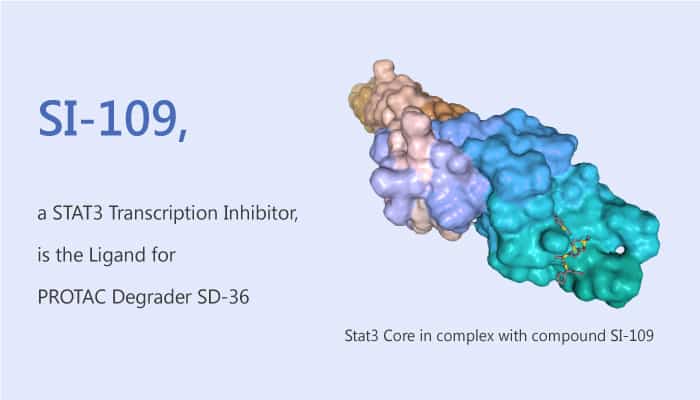As we have written in the article “SD-36 is a Selective PROTAC STAT3 Degrader”, proteolysis targeting chimera (PROTAC) technology has been a type of therapeutics that induces targeted protein degradation. Signal transducer and activator of transcription 3 (STAT3) is an attractive cancer therapeutic target. Longchuan Bai, et al have developed a potent and specific PROTAC of STAT3 degrader for cancer. SD-36 is a PROTAC that selectively degrades STAT3.
SI-109 is a STAT3 transcription inhibitor. In particular, SI-109 is the ligand of PROTAC degrader SD-36.
Researchers have designed SD-36 using an analog of CRBN ligand Lenalidomide and the STAT3 inhibitor SI-109. Especially, SI-109 binds to STAT3 with high affinities with a Ki of 9 nM. SI-109 is a high-affinity and cell-permeable STAT3 SH2 domain inhibitor. In the cell-based functional assay, SI-109 effectively inhibits the transcriptional activity of STAT3 in a STAT3-luciferase reporter assay (IC50=3 μM).

SD-36 inhibits the MOLM-16 cell line with an IC50 of 35 nM. Moreover, SD-36 is nearly 100-fold more potent than SI-109. In comparison, SI-109 exerts a moderate growth inhibitory activity in only 1 of these 18 cell lines, MOLM-16, which has a high level of pSTAT3 (Y705). SD-36 exerts growth inhibitory activities in leukemia and lymphoma cell lines while SD-36 exhibits strong growth inhibitory activity in only one of nine AML cell lines, it demonstrates potent activity in five of nine lymphoma cell lines.
All in all, SD-36 is a potent, efficacious and selective PROTAC STAT3 degrader (Kd=50 nM) and achieves complete tumor regression in vivo. SD-36 consists CRBN ligand Lenalidomide, linker and the STAT3 inhibitor SI-109.